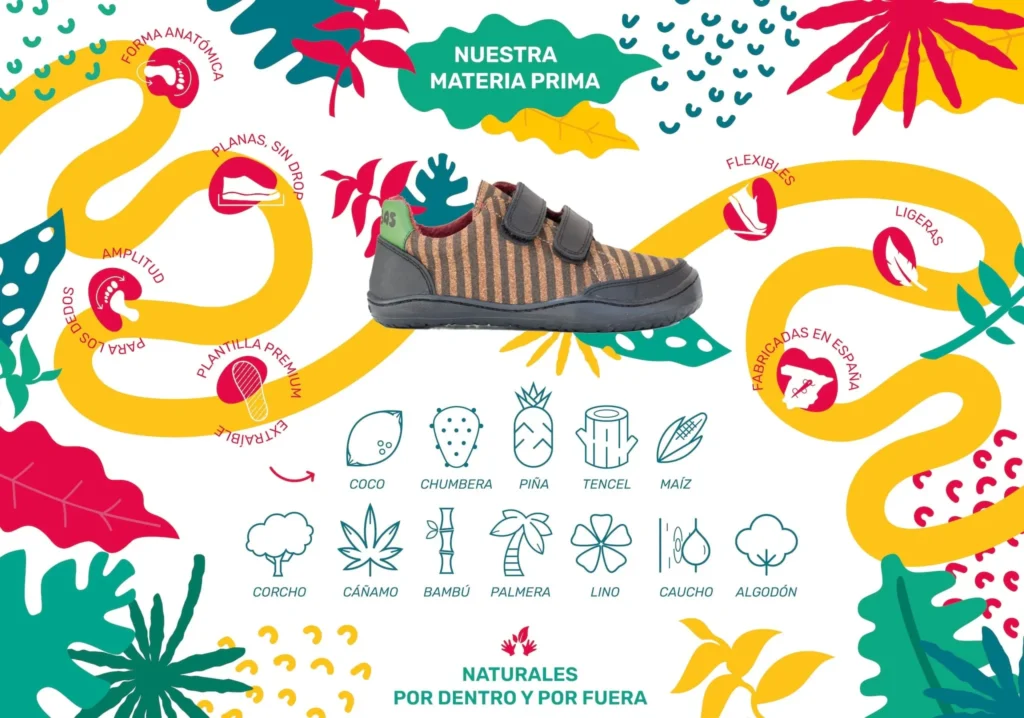
We do not work with materials of animal origin.
From an environmental point of view, intensive livestock farming is the biggest driver of deforestation. Chrome tanning is the most popular form of leather production and one of the most harmful. Large quantities of toxic chemicals and acidic effluents concentrated with heavy metals are dumped into the water.
It is true that vegan alternatives are becoming more and more common, but many of these materials that we find on the market as plan b, are synthetic (their raw material is crude oil).
Toxic chemicals and harmful solvents are used in their manufacture. Highly polluting compounds are also released when the waste is burned, as they do not biodegrade.
Our challenge is to manufacture footwear that respects the planet and people and, at the same time, to enable the transition away from dependence on oil.
MATERIALS
A natural and versatile material as an alternative to animal skin, made from the fibers of pineapple leaves.
The leaves are a waste product of existing agriculture, and their use generates extra income for the communities that harvest them. No additional land, water or pesticides are required to produce the raw material.
The dried leaves are used to form the base of the material, which is a non-woven mesh. The pigments are GOTS certified and a resin finish is applied for strength, durability and water resistance.
Sustainable, animal cruelty-free, low environmental impact and high social responsibility.
Cork is a naturally waterproof, lightweight, organic, renewable and biodegradable material. It is also flexible, washable and a great thermal insulator.
It is essentially the bark of the cork oak, a tree found mainly in the western Mediterranean. Cork oak forests are a brake on climate change due to the amount of CO2 they absorb and their extraction does not cause any negative impact, as it does not require the tree to be cut down. It is an example of how natural materials can be sustainable and aesthetic, both in footwear and in everyday objects such as original plant pots.
We are aware of the importance of using alternatives to conventional cotton.
Organic cotton is cotton grown free of toxic substances such as fertilizers, insecticides and pesticides of petrochemical origin. The seeds used are not transgenic. Water is managed more efficiently (95% of this water is rainwater and through the increase of organic matter in the soil).
It is not only good for the consumer’s health, but also for the producer’s health, from the farmer to the person who manufactures it, due to the inhalation of toxic products. It benefits the environment, respecting natural resources, reducing soil, air and water pollution. It uses techniques such as crop rotation and organic fertilizers. Compared to large cotton estates, organic cotton cultivation favors small farmers, promoting a more sustainable economy.
You will find it both on the outside and inside of our shoes, thus avoiding exposing your skin to toxic substances, organic cotton provides extra softness in direct contact with the skin.
GOTS certified
Its fabrics can absorb up to 20% water without feeling damp, as they are composed primarily of cellulose. It is antibacterial, fungicidal, neutralizes odors and acts as a barrier to UV radiation. As they are thermoregulators, they have insulating properties, ensuring coolness in summer and comfort in winter. It is also a naturally ecological, light and quite resistant fabric.
Flax is obtained from the natural fibers of the plant and, together with hemp, is one of the oldest textiles, having been cultivated since ancient Egypt.
Its naturally absorbent, thermo-regulating, antibacterial, fungicidal and UV-resistant (95%) properties make it the perfect fabric for both the exterior and interior of footwear, as it neutralizes odors. Its fibers are strong and durable, and fuse very well with dyes, so they keep their shape and color very well.
Hemp is a fast-growing plant that requires very little water and no herbicides, pesticides or synthetic fertilizers. As an added benefit to the environment, growing hemp improves soil health by replenishing vital nutrients and preventing erosion.
For all the properties mentioned above, this season we are introducing hemp fiber as the core of our insoles for the Bambas and Sambalias.
Antibacterial, fungicidal, deodorizing, insulating, thermoregulating and natural absorbent of excess perspiration.
The fiber is harvested from coconut shells, a widely available resource. Our inserts give new life to this valuable raw material.
Coconut fiber has a very high lignin content, making it very tough. Despite its inherent toughness, it is also elastic. The fibers are spun into ropes and these are transformed into sheets, which are then pressed and vulcanized into several layers.
Coconut is a product that naturally adapts to the human body. We feel comfortable in it, just as we feel comfortable in hemp, cotton and linen. The difference becomes apparent when we wear, for example, a PU insole.
TPR BIOVEGETAL:
A patented and innovative material that is 100% derived from vegetable oils.
Its capacity of adherence to the ground, flexibility and adaptability make it the perfect material to walk around the world.